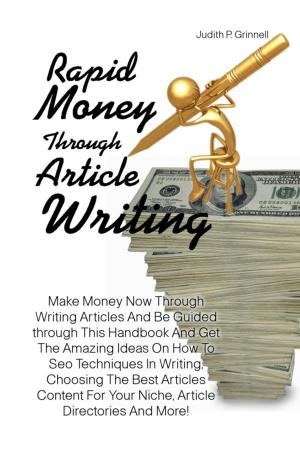Collection Of Excellent Business Ideas
Find Your Easy Business Solutions In This Handbook And Be Amazed With Its Small Business Marketing Ideas, Online Business Ideas, Best Ways To Invest Money And Best Credit Repair Tips!
Business & Finance, Entrepreneurship & Small Business, New Business Enterprises, Career Planning & Job Hunting, Entrepreneurship| Author: | David K. Brannon | ISBN: | 1230000020053 |
| Publisher: | KMS Publishing | Publication: | September 26, 2012 |
| Imprint: | Language: | English |
| Author: | David K. Brannon |
| ISBN: | 1230000020053 |
| Publisher: | KMS Publishing |
| Publication: | September 26, 2012 |
| Imprint: | |
| Language: | English |
A professional business plan is necessary when you want to start your own small business. There are many reasons that not only banks but also investors require such a document and this is to evaluate your objection for success, financial proposals and operation guide for your new small business.
Business plans commonly have three major sections plus the coversheet, table of content and an executive summary. Your business plan should be in length according to your small business. If it takes you numerous pages to explain the aspect of your small business then so be it but keep in mind that people do get tired of reading page after page of documents, try to decrease the wording within your business plan as much as possible.
The following is some helpful suggestions as you construct your professional business plan:
How many pages should my loan request be?
Your small loan request should be ten pages or less with adding in the attachments. If you are seeking a small business loan, keep in mind that most formal lenders will accept a summary sheet along with the loan application. You will usually need three years of income as well as tax records for small loans.
The business plan cover page
This page is solely for identifying your business from the others. Include your business name, logo, contact information, address, and the names of principals.
The business plan executive summary
This is nothing more than a summary of the rest of the plan. It should be placed first within the business plan but it placed last within the business plan. This page is what investors and banks will most definitely read your business plans turns into a sales proposal when presented to other people for investment purposes.
Do not forget your supporting documents
Supporting documents are very important. Ensure that you attach copies of these to the business plan. These will be documents will prove your points on many topics within the business plan. Also include any professional licenses you might have, contracts, resume’s, leases or even company brochure’s you might have created for the business you want to start. Promotional material is always a good addition as well.
A professional business plan is necessary when you want to start your own small business. There are many reasons that not only banks but also investors require such a document and this is to evaluate your objection for success, financial proposals and operation guide for your new small business.
Business plans commonly have three major sections plus the coversheet, table of content and an executive summary. Your business plan should be in length according to your small business. If it takes you numerous pages to explain the aspect of your small business then so be it but keep in mind that people do get tired of reading page after page of documents, try to decrease the wording within your business plan as much as possible.
The following is some helpful suggestions as you construct your professional business plan:
How many pages should my loan request be?
Your small loan request should be ten pages or less with adding in the attachments. If you are seeking a small business loan, keep in mind that most formal lenders will accept a summary sheet along with the loan application. You will usually need three years of income as well as tax records for small loans.
The business plan cover page
This page is solely for identifying your business from the others. Include your business name, logo, contact information, address, and the names of principals.
The business plan executive summary
This is nothing more than a summary of the rest of the plan. It should be placed first within the business plan but it placed last within the business plan. This page is what investors and banks will most definitely read your business plans turns into a sales proposal when presented to other people for investment purposes.
Do not forget your supporting documents
Supporting documents are very important. Ensure that you attach copies of these to the business plan. These will be documents will prove your points on many topics within the business plan. Also include any professional licenses you might have, contracts, resume’s, leases or even company brochure’s you might have created for the business you want to start. Promotional material is always a good addition as well.















